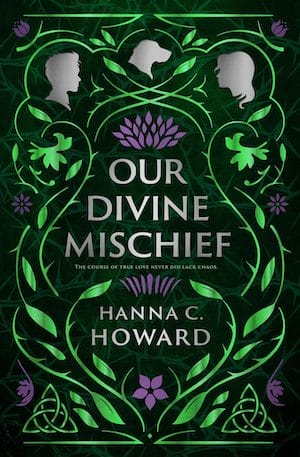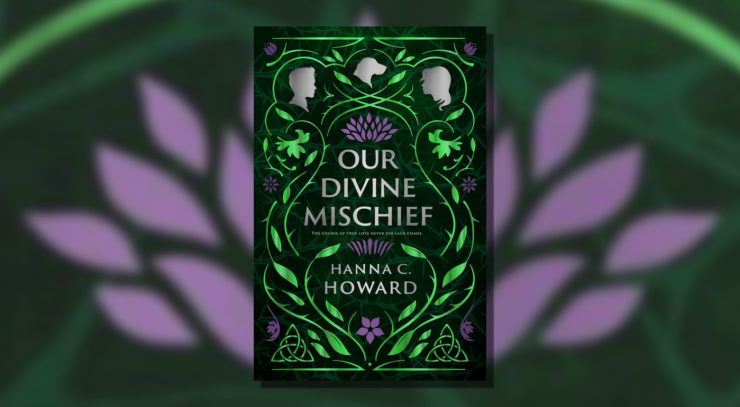The Goddess Trial is designed to push young people to their edge and mark their coming of age, but Áila LacInis is ready for whatever it brings…
We’re thrilled to share an excerpt from Our Divine Mischief by Hanna Howard, a fantasy YA novel inspired by Scottish culture that’s full of political intrigue, coming-of-age drama, and romance—publishing with Blink on October 17.
The Goddess Trial is designed to push young people to their edge and mark their coming of age, but Áila LacInis is ready for whatever it brings. She sets sail from her small fishing village to the island of the goddess Yslet, fully expecting a divine encounter, but what she finds is… nothing at all. The goddess is completely absent, and the only thing on the island is a dirty, mangy dog. Suddenly, everything Áila has ever known and believed is upended and her future becomes shrouded in uncertainty.
Hew already completed the Goddess Trial and received the designation of Unblessed. He is an outcast in the village, until he is tasked with assisting Áila through a series of Ordeals the town elders designed to compensate for her failed Trial. For the first time, he has hope he can make something of his life.
Orail isn’t quite sure who or what she is. She remembers little before Áila’s arrival on the island, and now all she knows is that she’ll never leave Áila’s side. But as she begins to realize and remember, she discovers powers—and an identity—she never could have imagined.
Chapter One
Áila
“Tack!” my father shouts. “Tack now!”
Rain lashes the deck of The Golden Thistle while a vicious wind whips the sails overhead, and pulleys clap a loud staccato against the main mast. My father’s crew rush to obey his orders—and I do my best to stay out of their way.
“LacTalish, are you sure there’s nothing I can do?” I yell over the roar of the storm as my father’s first mate and two of the crew dip the lugsail and begin the process of wrestling it down onto the deck. He barely glances at me as he squints up at the flapping canvas.
“You know there isn’t, lass,” he barks, cords of muscle standing out on his forearms like sail lines. “Just stand clear!”
I duck as the yard plummets, narrowly missing the side of my head.
Salt and scales.
“Áila!”
Buy the Book


Our Divine Mischief
I wheel toward Da’s voice. He’s at the stern, one hand gripping the tiller, the other braced against his driftwood crutch. Rain streams down his face. “Out of the way!” He taps his forefinger twice against the translucent, green medallion lying against his chest—as if I need reminding why I’m not allowed to help.
Only goddess-approved seafarers should be working right now. Those who’ve been to Yslet’s island and secured her blessing. Gotten the medallion. Done the apprenticeship. Earned their place on this boat and in our village.
My chest pinches slightly, like I have a hunger cramp there.
Sighing, I slip and slide over the deck, taking care not to get in anyone’s way. The boat climbs waves big enough to swamp us while I grip the gritty mizzenmast and focus on keeping my feet below me. Trying not to think about the fact that everyone else my age went to the island years ago, or that in a year I’ll be eighteen and too old for the Goddess Trial. Trying not to dwell on the fact that this birthday, again, Mother said no.
Da is still bellowing orders to his crew, his voice blending with the howl of the waves, the smell of brine, and the frigid plopping of rain across my skin. After a few minutes, the tension knotting my shoulders slips away, taking my tangled-up anger at my mother along with it. I am once again present with the whipping wind, the icy seawater, and the urgent possibility of capsizing.
All less formidable than my mother during an argument.
“I think we’re through it!” shouts Da.
I blink out over the water to find the clouds rolling off east and the way ahead starting to clear. Da’s crew slumps in relief as they start to pick up the mess of overturned barrels, snarled rope, and storm-flung fish that litter the deck.
“Lir has seen us safely through!” Da calls, to ripples of shaky laughter across the boat. Propping his crutch against the tiller and putting his weight on his good leg, he smiles ruefully at his crew. “Aye, the sea god isn’t always easy on us,” he says, “but he’s on our side. And he knows what it is to suffer, remember.”
I may not have the sea glass medallion that declares me a goddess-blessed fisher, but as far as Da’s concerned, I am still qualified to help clean up after a storm. Just as I’m qualified to mend nets, prepare bait, and handle the lines in fair weather—like the good, untrained grunt I am. So I wander the deck alongside the sailors as Da begins a familiar tale.
“Lir was in the ocean the day his daughter Ona died. Some say he was there because the whales needed guiding in their migration, some say he was feuding with Atobion and had to protect the boats from the sky god’s winds. And others say it was Arial’s doing, that the trickster goddess led him away from our isle of Fuiscea, far out to sea so that he would not be able to help when the wolves attacked Ona.”
Everyone here has heard the tale of the sea god’s greatest loss more times than they can count. But Da’s telling of it still loosens the tension wrapped about us after the storm and eases us back into peace as we head for home.
“Whatever the reason, Lir was not there to hold his wee lass in his arms when her lifeblood slipped away, nor was he there to comfort his wife, Yslet, as she begged the healing goddess Belaine to do something despite it being too late. But Lir is not a god of destruction, and so even after he learned of this great loss, he did not rage or wield his tempests. He did not sink any ships or drown any swimmers. The seas were quiet as a forest pool for a whole month after Ona died, as Lir poured his grief into a new work.”
I steal glances at the crew as the storm’s mess is tidied away. They are spellbound by Da’s voice, calmed by his confidence. As usual, his lame leg is no impediment to the range of skills he wields as a captain.
He continues. “Though water was his usual craft, Lir turned his hands to the island on which his daughter had died, determined to make it a monument for Ona: a place of stark and tragic beauty. He pushed back the wild forests where the wolves reigned, forcing most to flee across the channel to a new land. He raised up sheer cliffs, with bare faces where the waves could beat out his grief forevermore. He brought hills low and made them boggy, ripe with peat to make whisky: the elixir that dulls the blade of loss. And he covered the heath with beautiful purple heather and sharp, spiny thistles as a reminder of beauty forever intermixed with pain.”
I can feel Lir’s anguish as if my father has spoken it into being within me. It aches in my bones and tightens my throat.
Da pauses, and I look around to find his eyes fixed ahead, on the very cliffs he just described. West of them, the docks of Carrighlas swim into view. My heart pinches with something fierce and desperate as I, too, watch our village drift nearer.
I have lived here nearly eleven of my seventeen years, and I still don’t feel quite like I belong—though I want more than anything to believe that I do.
I glance back at Da, and he jerks his chin, inviting me to join him at the helm. As I cross the deck, he concludes his story and guides us into port.
“And thus our Fuiscea was born,” he says, “and the people in it were knitted to a land forged by the pain and love of the sea god and held together by the guidance of the goddess of beasts and birds. This land holds us in its arms, we the children of two gods whose first daughter was slain upon our shores. Her blood has become our blood, so that whatever we do, wherever we go, this will always be our home.”
There is an audible sigh from some of Da’s crew, and a few scattered cries of “Aye!” But I roll my eyes. Da’s stories end too soppily for me; it’s not as if being born in a place is all it takes to make it your home. Da’s hand rests briefly at the top of my neck and gives me a little squeeze, as if to say he knows what I’m thinking. Then he says, too quietly for anyone else to hear, “Talk to your mother again. Explain why you want to go.”
I grip the railing until my chapped fingers turn bone white. “I’ve told her, Da. She doesn’t care.”
“You give in too easily,” he counters gently. “She believes that, like her, you could be content without a medallion. Let her see what I have seen. The way you look at my crew like they’re goddess-touched, the way you yearn to help with the harder work. Áila.”
I turn to meet his blue eyes, earnest in the clear, salmon-pink light of the setting sun. I think of the way his crew looks at him—so different from the way he was treated in Learchlas after the accident that ruined his leg. He is esteemed among them, counted as their own. Because the work he does helps the village. And everyone can see his skills have been blessed by Yslet.
“I know you,” he says. “You’ll never be at peace until you’ve gone to the island yourself.”
I bite my lip, imagining for the thousandth time what it might be like to do the Goddess Trial, to meet Yslet, to come home with an apprenticeship and a medallion of my own. Sea glass, perhaps, like my father’s, inscribed with the word fisher. Or polished hoof, bearing the word shepherd. Proof I have a job to do in Carrighlas, that it’s truly my home.
“Let her see what I see,” Da repeats softly.
I almost never push back against my mother, whose will always seems immovable compared with mine. Nothing ever feels worth the fight. But perhaps this is.
“We’ll take care of the Thistle,” he says. “I’ll see you at home.”
When the anchor plunges into the black waters of the sea loch, I have already crossed the deck to the starboard bow. I leap easily over the railing, and land on the dock with a thump of my boots. Some of the fishers shout their goodbyes, and I wave back at them, breaking into a jog, heading toward the village.
I wish I had time to go run the cliffs—nothing clears my head and quiets my thoughts like a long, breathless gallop beneath the endless sky—but I need to talk to Mother before I lose my nerve. I push myself into a jog, and the turmoil inside me quiets to a low murmur beneath the hum of my moving body.
Excerpted from Our Divine Mischief, copyright © 2023 by Hanna Howard.










